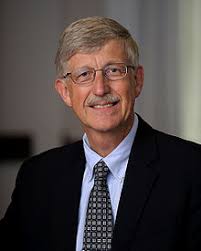
 It was largely regarded as the break through of the century in Bio-Technology when the human genome was finally mapped in 2000.
Here at last was given the sequence for all the three billion base-pairs of genes that make up human uniqueness.
Collins and his partner, Craig Ventner, had been working to crack the code for years; they did so on the 50th anniversary of Wilson and Crick's publication of the structure of D.N.A.
Now the way was open for the cure for such genetic diseases as cystic fibrosis, Huntington's disease and a host of other chromosome abnormalities.
In honor of their work Collins and Ventner were presented with:
"America's Best Leaders" award along with the "Presidential Medal of Freedom"
From being an atheist at graduate school, Collins underwent a dramatic transformation through his studies and his involvement with
dying patients. His final steps to faith in Christ were a long walk in the woods alone and his reading of "Mere Christianity" by C.S. Lewis.
He is now one of the foremost, eloquent advocates of his faith and his book "The Language of God" was a New York Times best seller for over a year.
Just in case you think that Christianity is for old ladies and people who can't think for themselves, I challenge you get a copy of the
"Language of God" and to go for a long walk in the woods alone.
I'll be happy to publish your responses on B.W.I.
Jubilate.
Ian
It was largely regarded as the break through of the century in Bio-Technology when the human genome was finally mapped in 2000.
Here at last was given the sequence for all the three billion base-pairs of genes that make up human uniqueness.
Collins and his partner, Craig Ventner, had been working to crack the code for years; they did so on the 50th anniversary of Wilson and Crick's publication of the structure of D.N.A.
Now the way was open for the cure for such genetic diseases as cystic fibrosis, Huntington's disease and a host of other chromosome abnormalities.
In honor of their work Collins and Ventner were presented with:
"America's Best Leaders" award along with the "Presidential Medal of Freedom"
From being an atheist at graduate school, Collins underwent a dramatic transformation through his studies and his involvement with
dying patients. His final steps to faith in Christ were a long walk in the woods alone and his reading of "Mere Christianity" by C.S. Lewis.
He is now one of the foremost, eloquent advocates of his faith and his book "The Language of God" was a New York Times best seller for over a year.
Just in case you think that Christianity is for old ladies and people who can't think for themselves, I challenge you get a copy of the
"Language of God" and to go for a long walk in the woods alone.
I'll be happy to publish your responses on B.W.I.
Jubilate.
Ian
The fact that you can read today's post is due in large part to Michael Faraday, who in the early 19th Century discovered the secrets and laws of electro-magnetism.
To explain fully his work and research in electro-magnetic induction is beyond my ability,sufficient to say that he discovered how to change mechanical energy into electrical energy. In so doing he invented what we commonly call a 'dynamo'.
From the very beginning of his life as an experimenter he believed that God was uniquely guiding him, not only in the production of electricity but also in the understanding of its LAWS.
Let me quote him:
"The beauty of electricity is that it is under a LAW and through that LAW it conveys the gifts of God to man."
Again:
"Nothing is too wonderful to be true if it be consistent with the laws of nature."
It is not stretching a point to call Faraday a genius, but listen to him in one of his later letters to a friend.
"Speculations! I have none, I am resting on certainties:
I know whom I have believed and am persuaded that He is able to keep that which I have committed to Him."
In his last lecture someone asked him what he expected to be doing in the next world. He replied:
"I shall be with Christ and that is enough!"
I trust all this will give a jolt to your mind as you start your day.
Jubilate.
Ian
 Recognized as the foremost mathematical physicist and engineer of his day Lord Kelvin was a true titan in Victorian Britain.
Born in 1824 his life spanned the period of England's greatest industrial and territorial expansion.
Students flocked to his lectures at Glasgow University where he was senior professor of applied science.
Kelvin has his name impressed forever in the term :
"Absolute Kelvin", -273 centigrade, the lowest any temperature can ever reach. He worked that figure out theoretically over 150 years ago. It was only confirmed by experiment last year in Switzerland.
Listen to what this towering figure said concerning his faith.
"The more thoroughly I conduct scientific research, the more I believe that science EXCLUDES atheism."
"Do not be afraid of being a free thinker. If you think STRONGLY enough you will be forced BY SCIENCE to believe in God."
Two thoughts stand out in those statements:
"Think strongly" and "Thorough research"
Neither are popular pursuits in a culture of superficial values and shallow mindedness.
May I exhort you to follow Kelvin's counsel and seek the truth in Christ with all your heart, for outer darkness is an awful cold place: about -273 Celsius.
Jubilate.
Ian
Recognized as the foremost mathematical physicist and engineer of his day Lord Kelvin was a true titan in Victorian Britain.
Born in 1824 his life spanned the period of England's greatest industrial and territorial expansion.
Students flocked to his lectures at Glasgow University where he was senior professor of applied science.
Kelvin has his name impressed forever in the term :
"Absolute Kelvin", -273 centigrade, the lowest any temperature can ever reach. He worked that figure out theoretically over 150 years ago. It was only confirmed by experiment last year in Switzerland.
Listen to what this towering figure said concerning his faith.
"The more thoroughly I conduct scientific research, the more I believe that science EXCLUDES atheism."
"Do not be afraid of being a free thinker. If you think STRONGLY enough you will be forced BY SCIENCE to believe in God."
Two thoughts stand out in those statements:
"Think strongly" and "Thorough research"
Neither are popular pursuits in a culture of superficial values and shallow mindedness.
May I exhort you to follow Kelvin's counsel and seek the truth in Christ with all your heart, for outer darkness is an awful cold place: about -273 Celsius.
Jubilate.
Ian
Today in our series on the scientists we consider one of the greats in the sphere of Astronomy and mathematics, Johannes Kepler.
Kepler was born on Germany in 1571 during a turbulent period after the Reformation. He was a devout follower of Martin Luther and his faith guided him in all his research and study of heavenly and earthly mysteries.
In fact his greatest work is considered to be
"Mysterium Cosmographican"
in which he introduced the modern theory of relativity.
However, while modern scientists still wrestle with the 'Unified Theory', (The harmonisation of all things) Kepler had it decided that the harmony of all things was in GOD HIMSELF.
To that end he said that God had put a perfect picture of Himself in the heavens:
The sun represented the Father, the star sphere, the Son and the space in between the Holy Spirit.
Naive you say?
Only in the last twenty years are cosmologists admitting that the VISIBLE universe is but a fraction of the INVISIBLE energy and matter that fills the space between the planets.
What they call "Dark Matter" Kepler called the Holy Spirit and if those boys who operate Hubble keep on searching they might just find out that he was right!
Jubilate
Ian
Intellectual arrogance must surely be one of the surest signs of a godless age.
The twenty first century has produced a special breed of atheists that strut on the field of science and yell out challenges to God like Goliath of old.
This week the series on the scientists is a reminder that the scientific knowledge we enjoy today was given to us by giants, both of intellectual and spiritual prowess, the like of which has never been exceeded.
Isaac Newton was such a man.
Born in England in 1642, it soon became clear that he was a genius in the sphere of science and mathematics.
By the age of 20 he had gained degrees at Cambridge university where he continued to study and lecture for the next thirty years. He developed a new branch of mathematics called "Calculus" and explained in his writings, 'The Principia', the laws of mechanics, thermo-dynamics, optics and motion.
Not content with these mighty forays into the physical world, he also wrote a book on Judeo-Christian prophecy which was the best seller of it's day.
He was one of the towering believers of his day.
Strange that this man, voted the man of the century by Time magazine, was born at the outbreak of the civil war and had his most productive years in 1665 and 1666, the years of the Great Plague and the Great fire of London.
Take heart. In the worst of times and in the darkest days God can give us His brightest lights.
Jubilate.
Ian




